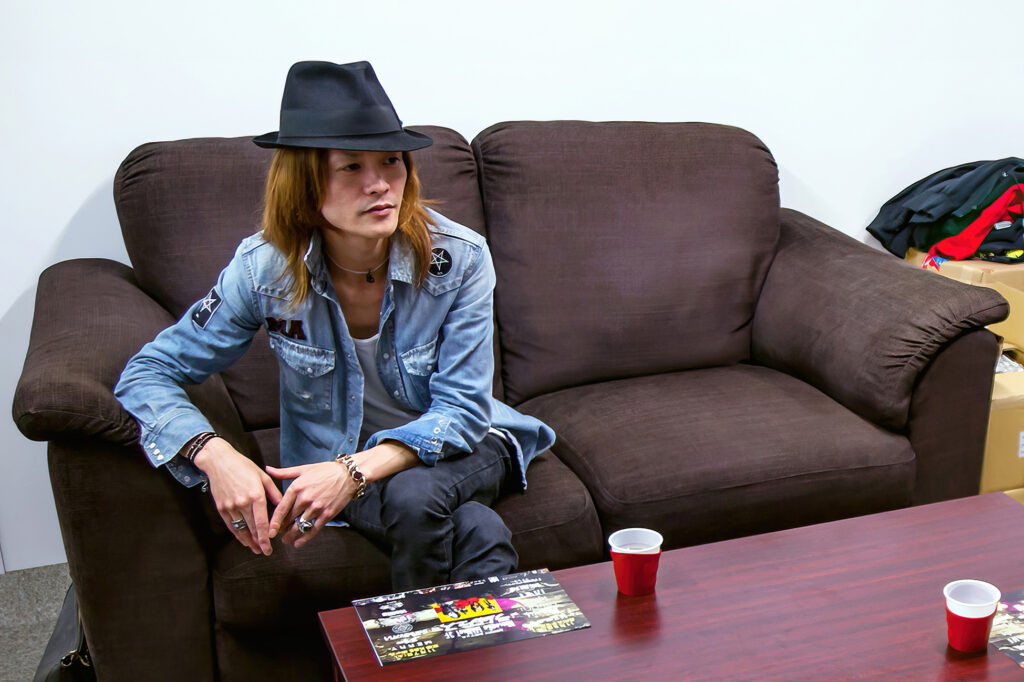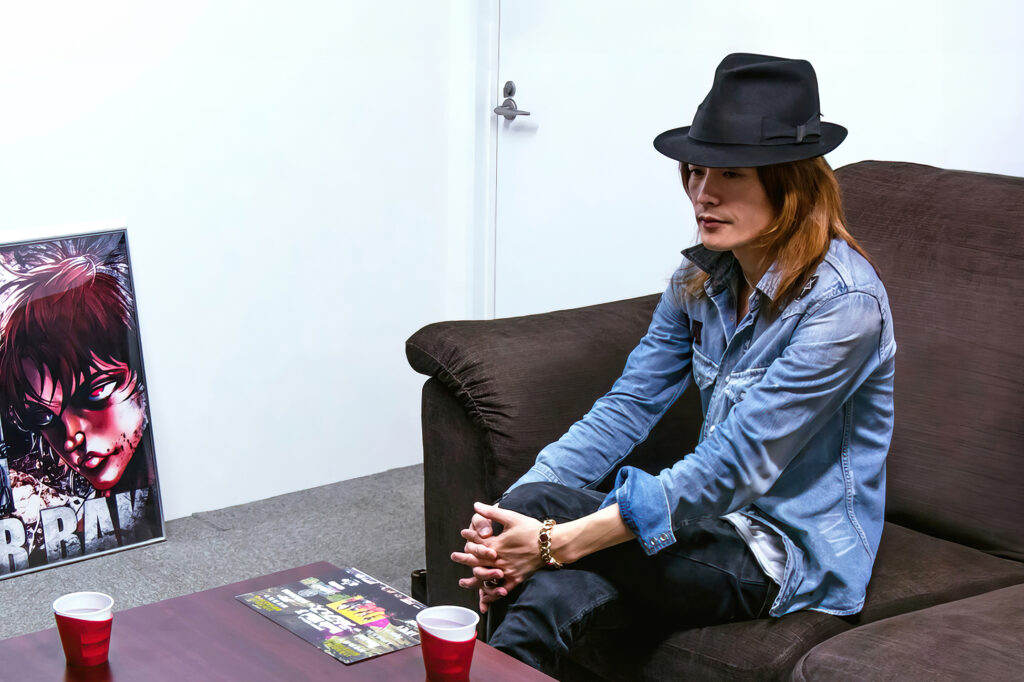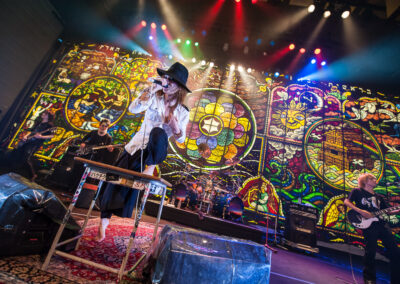Formed in 2001, MERRY is an unconventional rock band that blends various styles of music, from punk rock to blues and jazz (just to name a few). The band has a particular interest in the Avant-Garde movement of the interwar period and isn’t afraid to swim against the current by addressing political subjects (which is rare in Japan). These unique characteristics have become even more pronounced with the release of their latest studio album, NOnsenSe MARKeT, which, like this interview, showcases a mix of anger, wit, and humor. MERRY’s music is a fusion of different genres, creating a sound that is both energetic and eclectic. Their willingness to experiment and push boundaries sets them apart from other bands in the Japanese rock scene. With thought-provoking lyrics and a rebellious spirit, they tackle social and political issues, challenging the status quo. NOnsenSe MARKeT, their latest album, exemplifies their unconventional approach. It is a testament to their artistic evolution, showcasing their growth and maturity as musicians. The album is filled with a mix of raw emotions, clever wordplay, and a touch of satire, creating a unique listening experience. MERRY’s ability to blend different musical styles and their fearlessness in addressing controversial topics have garnered them a dedicated fanbase both in Japan and internationally. Their music resonates with those who appreciate their unapologetic approach and their willingness to challenge societal norms. In a music industry often dominated by mainstream trends, MERRY stands out as a band that stays true to their artistic vision. Their commitment to their craft and their willingness to push boundaries make them a force to be reckoned with in the rock scene.

——For those who are not familiar with MERRY yet, how would you describe the band?
Gara: I completely agree with your description of MERRY as a rock band with a punk spirit. Our music is a fusion of various genres because we draw inspiration from a wide range of musical influences. We don’t limit ourselves to one particular style, but rather embrace the freedom to experiment and incorporate different elements into our sound. When it comes to the lyrics, I take on the responsibility of writing them. For me, writing lyrics is a way to express my frustrations and discontent with the world around us. It’s a medium through which I can channel all the emotions and thoughts that have built up over time. I believe that the essence of our lyrics, which often touch on social and political issues, contributes to the punk spirit that defines our music. We strive to address topics that we feel strongly about, issues that we believe need to be brought to light and challenged. Whether it’s societal injustices, political corruption, or the struggles of everyday life, we aim to convey our indignation and provoke thought through our lyrics. In a way, our lyrics serve as a form of rebellion against the status quo. Overall, the combination of our diverse musical influences and the boldness of our lyrical content creates a unique and powerful energy that defines MERRY as a rock band with a punk spirit.
——Your last album, NOnsenSe MARKeT, was released on December 24, 2014. Although it has been available for almost a year, are there still things that you haven’t said about it?
Gara: This album was recorded in a Japanese recording studio, like all our previous albums. The entire creative process was quite lengthy, with some songs taking us two months to fully develop. The album was recorded over a period of six months. With this album, we changed our approach to composition. Before NOnsenSe MARKeT, each member would express their ideas as they came, and the songs would evolve somewhat randomly until we were completely satisfied. But for NOnsenSe MARKeT, the music composition came after the lyrics were written. I first wrote all the lyrics, and then the other members added their personal touches to create the final atmosphere of the album. This change in our approach allowed us to have a more focused and cohesive sound. It gave us the opportunity to fully explore the emotions and themes conveyed in the lyrics and translate them into the music. It was a different way of working for us, but it resulted in a more intentional and powerful album. NOnsenSe MARKeT is a reflection of our growth as musicians and as a band. It captures our thoughts, frustrations, and observations about the world around us. It’s an album that we poured our hearts and souls into, and we hope that listeners can connect with the emotions and messages we tried to convey through the music. I think, NOnsenSe MARKeT represents a significant milestone in our musical journey. It showcases our evolution in terms of songwriting and our commitment to creating music that is meaningful and impactful. We are proud of this album and the artistic growth it represents for us as a band.
——If you were to outline a typical composition process, how would you describe it?
Gara: I would say it consists of three main stages. Firstly, we establish a theme. Each of us works on ideas that stem from that theme, either at home or in the studio. Secondly, we exchange our ideas, opinions, and feedback through email exchanges. We listen and re-listen to the demos. The songs gradually evolve. To give you a better idea, our exchanges go something like this: “If you play the guitar in this way, then I think the bass should sound like this.” Gradually, the songs develop and take shape until the third stage, recording. During the recording stage, we bring all the ideas together and start laying down the tracks. We experiment with different sounds, arrangements, and techniques to capture the essence of each song. It’s a collaborative process where we all contribute our individual skills and ideas to create the final product. Once the recording is complete, we move on to the mixing and mastering stage. This is where we fine-tune the sound, balance the levels, and add any additional effects or enhancements to ensure that the songs sound their best. Throughout the entire process, there is a constant back-and-forth between us as we refine and polish the songs. We strive to create music that not only resonates with us but also connects with our listeners on an emotional level. Our composition process is a combination of individual creativity and collective collaboration. It’s about capturing the essence of our ideas and translating them into a cohesive and impactful musical experience.
——What are the three songs you recommend the most?
Gara: Firstly, I would highly recommend listening to Chiyoda-sen Democracy, as I consider it to be the standout track of the album. Through this song, I express my frustrations towards Japan in a direct and straightforward manner. It serves as a cry for change, with a message that questions the current state of affairs and urges for progress. The lyrics touch upon various societal issues, but I prefer to convey my discontent through subtle messages and imagery rather than explicit statements. For instance, Chiyoda-sen refers to a subway line in Tokyo that connects important political and governmental institutions. It symbolizes the core of the city where decisions are made. The song carries a sense of cynicism as I reflect on how I, too, have been influenced by the system I criticize. It’s a melancholic piece that explores the complexities of societal structures and personal disillusionment.
Secondly, I would suggest listening to NOnsenSe MARKeT, which is not only the title track but also represents the essence of our band. As you mentioned, the lyrics infuse MERRY with a punk spirit while incorporating elements of blues and jazz. It’s a unique blend that reflects my personal experiences and perspectives as a Japanese individual. The song embraces a sense of freedom and experimentation, allowing us to explore different musical styles and themes. If MERRY were a shopping mall, this song would encapsulate the diverse range of offerings. It might evoke reactions like, “This is nonsensical! What is this? All these trivial and useless things, both expensive and cheap.” It’s a playful and dynamic track that showcases our versatility as a band.
Lastly, I would like to highlight Tokyo. This song holds a special place for me as it delves into my personal journey and aspirations. Having arrived in Tokyo with dreams and ambitions, I joined small music groups with the desire to make a difference and “change the world.” “Tokyo” explores the obsessive nature of dreams and the sacrifices we are willing to make to achieve them. It’s a reflection on the challenges and obstacles encountered along the way. I draw a parallel between the city itself and the dreams I sought to fulfill through my experiences there. The song navigates between moments of joy and moments of disillusionment, ultimately questioning the reasons behind my decision to come to Tokyo and stay.
These three songs offer a glimpse into the diverse themes and emotions present in our album, NOnsenSe MARKeT. They showcase our ability to address societal issues, experiment with different musical styles, and delve into personal introspection. I believe they provide a well-rounded introduction to our music for those who are not yet familiar with our work.
——The concept behind NOnsenSe MARkeT is a critique of modern societies. The title itself is stylized with certain letters capitalized: N, O, S, M, A, R, T, which stands for ‘No Art, No Smart.’ Can you tell us what this message represents?
Gara: You’re right! The message behind “No Art, No Smart” in NOnsenSe MARkeT is a reflection of our critique of modern societies. In today’s world, art and creativity are often undervalued or overlooked, while intelligence and knowledge are narrowly defined and prioritized. This message serves as a call to action, urging individuals to recognize the importance of art and creativity in shaping society and fostering personal growth. For me, music is a powerful medium to convey these messages and address societal issues. It allows us to express our thoughts, frustrations, and observations in a way that resonates with listeners. Through our music, we aim to stimulate people’s minds, encouraging them to take charge of their lives and challenge the status quo. We want to inspire individuals to question the norms and systems that may be holding them back, and to actively participate in shaping a better future. In Japan, criticizing the current state of affairs can be seen as a taboo subject. However, as a member of a rock band, I feel a responsibility to speak up and use our platform to address these issues. Art has always been a vehicle for free expression, providing a space for artists to challenge societal norms, provoke thought, and spark conversations. By embracing art and creativity, we can foster a more open and inclusive society that values diverse perspectives and encourages critical thinking. The concept of NOnsenSe MARkeT is not just about highlighting the problems within society, but also about offering a sense of empowerment and hope. It is about encouraging individuals to reclaim their agency, to become active participants rather than passive victims of societal pressures. Through our music, we aim to inspire listeners to think critically, to question the status quo, and to find their own paths towards personal growth and fulfillment. In essence, “No Art, No Smart” encapsulates our belief that art and creativity are essential components of a thriving society. By embracing art, we can foster innovation, empathy, and a deeper understanding of the world around us. It is through this lens that we hope to provoke thought, inspire change, and contribute to a more vibrant and inclusive society.
——These serious topics were approached with humor in the videos. The NOnsenSe MARkeT and Chiyoda-sen Democracy music videos are satirical portrayals of Japanese society. In the ending of NOnsenSe MARkeT, the terrorists transform into police officers. Does this mean that we are without hope?
Gara: NOnsenSe MARkeT and Chiyoda-sen Democracy music videos, both directed by Yamaguchi Yasuyuki, employ a satirical approach to shed light on the serious topics addressed in the songs and the album as a whole. While tackling societal issues, we decided to infuse a sense of humor, adding a touch of childishness and grotesqueness to the visuals. This deliberate choice serves to create a contrast between the lightheartedness of the videos and the weightiness of the lyrics, prompting viewers to delve deeper into the underlying messages.
In the Chiyoda-sen Democracy video, you’ll notice my persistent smile throughout. This intentional juxtaposition between the lyrics and my cheerful demeanor adds an intriguing layer to the song’s message. By presenting an attitude that is completely opposite to the critical tone of the lyrics, it invites viewers to question and contemplate the complexities of societal structures and personal disillusionment. The contrast between the visuals and the message creates a thought-provoking dynamic that encourages deeper engagement with the song’s themes.
Regarding the NOnsenSe MARkeT video, your observation is accurate. At the beginning, we portray ourselves as terrorists, representing marginalized individuals who seek to change the world due to its perceived senselessness. However, as the video progresses, the allure of material gain pulls us into the very mechanisms of the system we initially opposed. This transformation is symbolized by our transition from terrorists to police officers. While it may seem extreme, it serves to highlight the idea that greed and the pursuit of wealth are the underlying causes of societal decay. The presence of a check in the video further emphasizes this notion. By employing satire and visual storytelling, we aim to convey a deeper message about the detrimental effects of greed and the compromises individuals make within societal structures. The transformation from terrorists to police officers represents the seductive power of money and how it can corrupt even those who initially sought to challenge the system. It serves as a commentary on the pervasive influence of materialism and the potential for individuals to become complicit in perpetuating the very issues they once opposed. In France, is raising the middle finger like this (flips the bird) also frowned upon?
——Yes (laughs). This gesture is universally recognized as one of the most offensive. However, it is likely to be even more negatively perceived in Japan. France, on the other hand, has a history of being a country of revolutionaries.
Gara: Initially, I had the intention of expressing my frustration with the state of the world by flipping the middle finger, but ultimately, I decided against it. Together with the other band members, we questioned whether this gesture would cross a line. In Japan, the concept of Nenkô Jôretsu (seniority-based hierarchy) holds significant influence. Linked to the idea of lifetime employment, it grants advantages to older individuals at the expense of the younger generation. In essence, respect for elders is of utmost importance. So, making the middle finger gesture in front of Japanese symbols would have been seen as disrespectful towards those individuals… The younger generation is often not given enough consideration, in a sense. How is it in France?
——To a certain extent, there is some similarity. But, I believe that the concept of respect, in a broader sense, is much stronger in Japan, and that is not necessarily a negative thing. It is why I left France and chose to come to Japan (laughs).
Gara: There is an increasing number of young Japanese people who have a desire to venture abroad. Despite my criticisms of Japan, I have made the decision to stay here. I wouldn’t want to live anywhere else. Despite its imperfections, I have a deep love for my country. I am truly impressed by those who are willing to leave everything behind and start a new life from scratch in a foreign land. Personally, I don’t think I could have taken that leap, even if I were fluent in other languages.
——It’s not an easy thing to do.
Returning to the album, NOnsenSe MARkeT, have you ever had any completely unnecessary consumption habits?
Gara: Yes, in the past (laughs). But I don’t have them anymore. There was a time when I couldn’t resist buying guitars, even though I didn’t actually play them. One day, when I returned home, I had a realization. As a singer and not a guitarist, this habit of mine was utterly senseless. I still have one guitar left, which is now safely stored in its case and rarely sees the light of day. Upon reflection, I also recall buying an accordion, despite having no knowledge of how to play it. I can’t quite remember why I did it, perhaps it was simply to use it as a decorative object.
——Perhaps it’s a sign that you should come and live in France (laughs). Some tracks like “Hide and Seek, Fukurou, and Unreachable Voice delve into deeply personal emotions such as love, despair, and disappointment. What do these subjects bring you compared to writing about societal issues? How do you select the themes?
Gara: My musical roots lie in melodic genres, which often explore themes of sadness, melancholy, attachment, loss, and nostalgia. I used to listen to a lot of folk and retro songs. When MERRY started making music, we built our artistic universe upon these foundations. Both personal and political writing styles hold significance in my heart. The choice between them depends on my current mood and the musical style we want to associate with a particular song. If I feel the need to unleash my anger, I would opt for political subjects, expressing them in a raw and powerful manner, like a scream, to liberate myself from all the mess. This world is truly rotten, don’t you agree?
——It is. But there are beautiful things too.
Despite the challenges and negativity portrayed in NOnsenSe MARkeT, our latest single, Happy Life, showcases a surprising and positive side of MERRY.
Gara: Yes, that’s true. With this song, I wanted to express a more optimistic aspect of myself through the theme of happiness. It’s my way of reminding everyone that there are beautiful things in this world, even amidst the chaos. I believe that happiness can be found everywhere if we open our eyes wider and take a broader perspective. When we constantly see dark and troubling images on TV, it helps us put things into perspective and realize that our lives aren’t as negative as they may seem. We should appreciate the simple joys of life, like being able to eat, drink, and enjoy entertainment. These are privileges that not everyone has. It’s also important to cherish the people we love and value the connections we have. The music video for “Happy Life” reflects this theme. It portrays a playful tomato war between two groups, where people find joy and camaraderie even in the midst of competition. The ending of the video symbolizes the happiness that can be found through simple moments and shared experiences. I must admit that the use of tomatoes in the video raised some ethical concerns and didn’t please everyone. But sometimes, we need to let go and find a balance. The video was directed by Hiroyuki Kondou.

——The music video portrays a clash between the band and a group of girls, which reminds me that you recently held two special concerts: one exclusively for women and one exclusively for men. What is the reason behind these gender-segregated concerts? How do they differ?
Gara: Women have always outnumbered men at our concerts, but we would like to have an equal balance of both genders in the audience. Since male fans often feel intimidated by the overwhelming presence of women, they can feel uncomfortable due to their numerical inferiority. This is quite common in Japan. Therefore, we decided to hold separate concerts for men and women, allowing each group to enjoy themselves without any discomfort. These audiences are very different. Before the concert, the girls tend to cheer our names, and I often hear “Gara, Gara.” The boys shout, but they don’t mention our names. Inside the venue, the most noticeable difference is the smell, which is much more pleasant with the female audience (laughs). When it comes to the male audience, it really smells like men. However, we also enjoy the masculine atmosphere. There’s a kind of buildup of energy during the anticipation before the confrontation, and the tension rises, which is very motivating. I can compare it to a face-to-face duel that you don’t want to lose. Both types of concert setups are interesting, truly. And yes, our goal is to expand our audience. We want to see more and more people attending our shows each time.
——In a few days, the NOnsenSe MARkeT 3F Lamb Fest, a two-day festival hosted by MERRY, will take place.
Gara: The concert on November 7th will be very special for MERRY because exactly 14 years ago, we had our very first live performance in front of an audience. It was on November 7th, 2001. We plan to play both old and new songs on both dates, November 5th and 7th, but the version of MERRY written in katakana will focus more on our beginnings, both in terms of visual style and the music itself. Our goal with this festival is to showcase everything that MERRY has created in our 15-year career and, most importantly, to convey a message: the band hasn’t changed, we are still the same people!
——The first time you came to Europe was 9 years ago.
Can Europeans expect a return?
Gara: It’s not planned at the moment. I don’t feel like MERRY is anticipated or in demand in Europe. But if I’m wrong, and I hope I am, show yourselves! If Europeans want to see us, we need to hear about it. Make yourselves known! The first time we came to Europe was during the boom of J-rock and visual kei. It was nine years ago, and I don’t remember much. In France, I didn’t do anything special because I quickly felt homesick. I went to see the Eiffel Tower, but other than that, I stayed in the hotel for most of the trip. I brought a camera, but I didn’t even take it out of the suitcase. Maybe my discomfort was due to it being my very first trip abroad. As for the food, I remember a large amount of soup, so big that I didn’t know if I should drink it, and a huge piece of meat, so thick that I didn’t know how to eat it. I ended up eating it, of course (laughs). As for the concert, I remember the differences between the Japanese and French audiences. When we play intense and aggressive songs, the Japanese audience moves a lot, quite synchronously, while the French audience remains relatively calm and experiences the concert in a more individual manner. However, when we play calm songs, the Japanese audience remains stoic while the French audience continues to move, swinging their arms from left to right, up in the air, and shouting during guitar solos, for example. I found it quite fascinating and perplexing. But I am happy that our songs were well-received. Before coming, I thought that no one outside of Japan was listening to us. I am still and will always be deeply touched by that.
——I think that MERRY is still highly anticipated in France.
Gara: Thank you.
__________________
Mandah FRÉNOT
(c) VMJ



